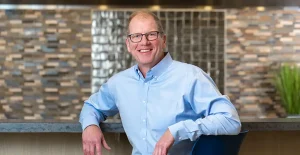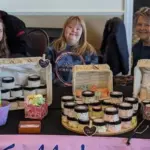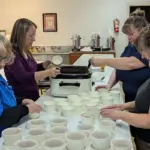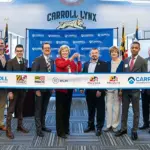Daniel Cooper, CEO of Fuchs North America
by Kym Byrnes
Daniel Cooper grew up in the Midwest and moved to Baltimore County in 2005 to work at Fuchs, a company that manufactures food seasoning and spices. He was brought in when the company sought to “re-energize its management team and restructure,” he says. As CEO of the Fuchs North America headquarters, Cooper oversaw the facility’s move from Owings Mills to its current state-of-the-art, 21-acre campus in Hampstead.
A foodie at heart, Cooper says that Hampstead provides an ideal location for the facility and that the company is committed to being good stewards of the community, as evidenced by its ongoing support of local nonprofits. While there are challenges to holding a leadership position in a company impacted by the outcomes of international politics, Cooper says that what is at the top of his mind daily is the task at hand: “bringing the joy of food to life.”
“We’ve [Fuchs North America] supported the Boys and Girls Club, the Westminster Rescue Mission, the Carroll County Youth Service Bureau, Carroll Community College, Carroll Hospital, Habitat for Humanity, and other organizations in various ways. We feel strongly that we need to support these organizations that touch our community, not only financially but also through volunteering and other projects.” – DANIEL COOPER
Can you talk about Fuchs and how Hampstead fits into its operations?
Fuchs is a global organization headquartered in Germany, with businesses on four continents, including North America. Globally, about 50% of our business is creating retail products that are sold in grocery-type formats. That is primarily in Europe. The other half of the business is what we call the “food industry,” where we make products that we sell to other food companies.
Our primary role in the food industry is providing flavor and culinary expertise in flavoring food for our customers to help them meet consumer demand. Here in North America, we only do the industry side; we don’t have the retail presence. In North America, we have about 210 employees between two facilities: the Hampstead headquarters, which is the primary manufacturing site for North America with about 190 to 200 employees, and a small facility in Grand Forks, North Dakota, with about a dozen employees.
Fuchs North America had been in Owings Mills. When the company expanded, it moved to Hampstead, where it built a 21-acre campus. What made Hampstead an appealing location?
We outgrew our Owings Mills facility and didn’t have room to expand. In searching for a new location, we were sensitive to the fact that employees would be impacted, so we looked to be in the same general area, including southern Pennsylvania, Baltimore County, and Carroll County. Carroll County’s business development team, as well as the town of Hampstead, were by far the most responsive and attentive.
They helped us in many areas, like finding a good location and making that transition. They promoted Carroll County well. The other factor was trying to find an area that would provide us with a stable employee base. Anytime you’re going to move, you’re going to have some attrition from employees over time, so we wanted to make sure if we were moving, there would be a community we could grow with from an employee standpoint.
How are current events in the national and global marketplaces affecting your business?
Our business model is global, so everything is very much international. A large portion of the materials and ingredients we work with come from different parts of the world, and we sell to different parts of the world, so international politics is important for us. Like a lot of businesses, we’re watching the tariff discussions very closely. It has yet to be seen how that negotiation process plays out, but it affects us both on the sales side as well as on the purchase of raw materials.
From a more macro perspective, we have a parent company in Germany and businesses all over the world — Italy, the U.K., France, and China. Obviously, each of them is also trying to do business in their region, and this heightened state of animosity among politicians does present a level of concern for us. The relationships are, at best, in a new era of political stability, with post-World War II NATO alliances shifting dramatically. That is something we have to watch very closely because we’re operating in all these different locations.
How did you get into this line of work? Was it the business or the food?

I’ve worked for spice and seasoning companies since college. It’s just where I got my start as an intern. Since then, I’ve been with a variety of different companies, leading me to Fuchs. It’s in my blood. Food and cooking are passions of mine. I like to cook. I love different foods. That’s the best part of traveling to me — the ability to eat authentic regional cuisines in different parts of the world — I just enjoy that.
For our business, from an industry standpoint, our mantra and our tagline is “we bring the joy of food to life.” We sell to all different segments of the food industry — snack foods, breakfast, sausage, meats, and dairy. In each of those areas, we’re the flavor component behind the food.
My analogy is you can eat a chicken breast with nothing on it, and it provides the nutrition you need, but that’s not enjoyable. When people think about food, whether they are trying a new recipe at home for their family or eating at a new restaurant, it comes down to that flavor experience. We are a company that provides that flavor to our customers’ products. We’re the distinguishing factor for our customers’ products — whether to retail at a grocery store or industrial — making products for restaurants.
Do you have a favorite food or style of food?
Asian food, in general, is among my favorite and Mediterranean. But even within those, there’s such a vast variety of food and flavors.
Your facility features a sensory lab. What happens there?
People are eating products that we manufacture every day. They don’t know it, but we’re providing the flavor behind their food. In that vein, “sensory” is the process of using people to taste products for a variety of different purposes. The sensory lab is a controlled room where we bring people in to taste different products. The processes vary.
For example, we might use a panel to determine if they can taste a difference between a regular product and a lower sodium version of the product. We might test to determine a preference, offering four varieties of barbecue and seeing what the people prefer. We might also use a trained panel of testers who have gone through an education process and have a very specific and developed skill set. Most of the sensory work we do is using employees, but there are also consumer sensory tests that are done. We use third parties to do bigger consumer tests to reach a broader demographic.
Are there challenges inherent in running a global organization from a small town like Hampstead? Are there benefits?
We are a global company, so there is not really one central ideal place for a business location. While Hampstead is relatively rural, it’s also very close to major airports. It’s not that hard to get anywhere from here, and that is a big attraction for us as a business. For someone who moved here from a different location, I think that’s an awesome component of living in this area, whether it’s access to sports teams or to historical offerings. There is so much you can do from here with a relatively short travel distance.
What are you really proud of when it comes to the work you’ve done or the work Fuchs does?
We’re impacting lives and bringing the joy of food to life every single day. That’s something we take pride in and something that’s central to how we work. I’d say we believe, as a global organization, that we have a responsibility to leave the world in a better place than we started with. In our businesses, regardless of country, we believe that we are stewards of our environment and community and approach that from a practical standpoint. We do that by trying to touch the communities that we live in.
For example, in our program for charitable giving, we focus on the organizations that touch our community; our community is defined as where we work and where our employees live. Our sustainability practices aim to get down to that local level, as opposed to more pie-in-the-sky, save-the-world kind of thing.
How does Fuchs engage with or impact the Carroll County community?
We believe strongly that we need to support our community and to do that, we support a variety of charitable organizations across the county. I have served on various nonprofit committees and boards. We’ve supported the Boys and Girls Club, the Westminster Rescue Mission, the Carroll County Youth Service Bureau, Carroll Community College, Carroll Hospital, Habitat for Humanity, and other organizations in various ways. We feel strongly that we need to support these organizations that touch our community, not only financially but also through volunteering and other projects.









